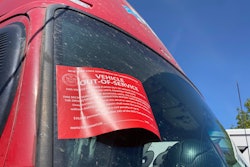Trucking news and briefs for Tuesday, Feb. 11, 2025:
Troopers targeting distraction, speed, seat belt use along Ohio Turnpike
Law enforcement officers in Ohio announced they will be conducting traffic safety initiatives throughout 2025 along the Ohio Turnpike.
The Ohio State Highway Patrol (OSHP) and the Ohio Turnpike and Infrastructure Commission (OTIC) are working together to reduce crashes and curb unsafe driving behaviors behind the wheel in both passenger and commercial vehicles.
“The motoring public can expect to see troopers conducting high-visibility patrols on the turnpike through the rest of 2025, focusing on distracted driving, speed enforcement and safety belt usage,” said Lt. Erica Gockstetter. “But we cannot just enforce our way to a safer Ohio Turnpike. To truly create the safest driving environment, we need a commitment from motorists to drive in ways that are responsible and safe.”
Gockstetter added that the commitment also extends to how drivers of passenger vehicles interact with commercial trucks on the roadway.
“We want to remind the motoring public to use caution around commercial vehicles. Avoid the no-zone by staying out of the blind areas in the front, back and sides of these vehicles. Do not cut in front of a commercial vehicle, as they require more stopping distance than a passenger vehicle,” she added. “We equally ask commercial drivers to drive alert, follow the hours-of-service regulations, and be attentive to blind spots when changing lanes. Additionally, driving appropriately for road or weather conditions is crucial.”

Over a five-year period (2020-'24), there were 3,810 speed-related crashes on the Ohio Turnpike, in which 18 people lost their lives and 1,514 people were injured; 326 where a distraction was a contributing factor, causing one fatality and 141 injuries; and 29 fatalities where a safety belt was available but not in use.
Chris Matta, chief engineer/deputy executive director of the Ohio Turnpike and Infrastructure Commission, called on all drivers of passenger vehicles and commercial trucks to increase their awareness of their own unsafe behaviors behind the wheel, such as aggressive and distracted driving, to reduce crashes and prevent injuries and fatalities on the Ohio Turnpike and elsewhere.
[Related: CVSA's out-of-service criteria: New for 2025]
FHWA suspends grant program for EV chargers
The Trump administration’s Federal Highway Administration (FHWA) last week announced the suspension of the National Electric Vehicle Infrastructure (NEVI) grant program, which provides funding to states to strategically deploy electric vehicle (EV) chargers and to establish an interconnected network to facilitate data collection, access and reliability.
In a Feb. 6 letter to state Department of Transportation leaders, FHWA Associate Administrator Emily Biondi said new DOT leadership “has decided to review the policies underlying the implementation of the NEVI Formula Program,” and is rescinding guidance related to the program, thus suspending the approval of all State Electric Vehicle Infrastructure Deployment plans for all fiscal years.
“Therefore, effective immediately, no new obligations may occur under the NEVI Formula Program until the updated final NEVI Formula Program Guidance is issued and new state plans are submitted and approved,” the letter added.
Fuel retailers responded to the suspension of the program, with truck stop organization NATSO and the Society of Independent Gasoline Marketers of America (SIGMA) signaling their intent to work with the Trump administration to improve the program.
“The NEVI program has in many states helped catalyze existing gas stations and truck stops to install fast, state-of-the-art EV charging stations,” the groups said. “In other states, NEVI has been implemented poorly, with chargers either still not built or, if they are, they're in places nobody wants to stop. We are encouraged that the Trump Administration is reevaluating rather than abandoning the NEVI Program and intend to work closely with the Administration to share our experience and keep what's been working, while reconsidering clearly unproductive approaches."
[Related: Truckers' top 5 priorities for the new Trump administration]
ATRI seeks input on hiring practices for truck drivers with criminal convictions
The American Transportation Research Institute (ATRI) has issued a call for motor carriers to participate in a new survey examining hiring practices for truck drivers with prior criminal convictions.
As the trucking industry tackles truck driver workforce challenges, ATRI’s Research Advisory Committee (RAC) prioritized this study to explore underrepresented hiring pathways, including for individuals with criminal histories.
The survey examines motor carrier hiring practices, decision-making factors, and workforce reintegration strategies, with optional follow-up research interviews for further insights. All responses will remain strictly confidential, ATRI noted.
“As the industry continues to seek out solutions to its various workforce challenges, there is a new emphasis on the possibilities of hiring truck drivers with criminal histories,” said Robyn Smith, Director of Driver Relations for May Trucking Company. “However, there is limited data on how to successfully integrate these individuals into motor carrier operations. ATRI’s research will provide value insight to help the industry balance safety, compliance, and workforce development.”
Motor carriers are encouraged to participate in the survey online here.









